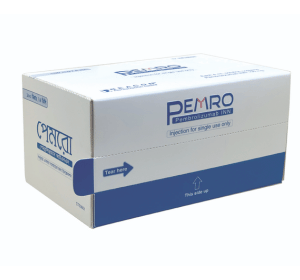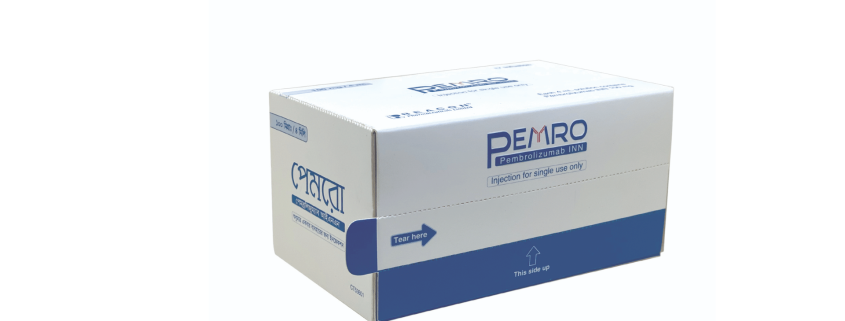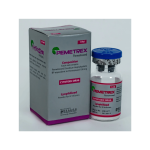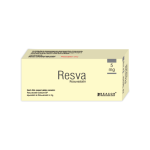Pemro
Generic Name:Pembrolizumab

Indications
Pemro is a programmed death receptor-1 (PD-1)-blocking antibody indicated:
Melanoma:
- for the treatment of patients with unresectable or metastatic melanoma.
- for the adjuvant treatment of patients with melanoma with involvement of lymph node(s) following complete resection.
Non-Small Cell Lung Cancer (NSCLC):
- in combination with pemetrexed and platinum chemotherapy, as first-line treatment of patients with metastatic nonsquamous NSCLC, with no EGFR or ALK genomic tumor aberrations.
- in combination with carboplatin and either paclitaxel or paclitaxel protein-bound, as first-line treatment of patients with metastatic squamous NSCLC.
- as a single agent for the first-line treatment of patients with NSCLC expressing PD-L1 [Tumor Proportion Score (TPS) ≥1%] as determined by an FDA-approved test, with no EGFR or ALK genomic tumor aberrations, and is: stage III where patients are not candidates for surgical resection or definitive chemoradiation, or metastatic.
- as a single agent for the treatment of patients with metastatic NSCLC whose tumors express PD-L1 (TPS ≥1%) as determined by an FDA-approved test, with disease progression on or after platinum-containing chemotherapy. Patients with EGFR or ALK genomic tumor aberrations should have disease progression on FDA-approved therapy for these aberrations prior to receiving Pemro.
Small Cell Lung Cancer (SCLC): for the treatment of patients with metastatic SCLC with disease progression on or after platinum-based chemotherapy and at least one other prior line of therapy.
Head and Neck Squamous Cell Cancer (HNSCC):
- in combination with platinum and FU for the first-line treatment of patients with metastatic or with unresectable, recurrent HNSCC.
- as a single agent for the first-line treatment of patients with metastatic or with unresectable, recurrent HNSCC whose tumors express PD-L1 [Combined Positive Score (CPS) ≥1] as determined by an FDA-approved test.
- as a single agent for the treatment of patients with recurrent or metastatic HNSCC with disease progression on or after platinum-containing chemotherapy.
Classical Hodgkin Lymphoma (cHL): for the treatment of adult and pediatric patients with refractory cHL, or who have relapsed after 3 or more prior lines of therapy.
Primary Mediastinal Large B-Cell Lymphoma (PMBCL): for the treatment of adult and pediatric patients with refractory PMBCL, or who have relapsed after 2 or more prior lines of therapy.
Urothelial Carcinoma:
- for the treatment of patients with locally advanced or metastatic urothelial carcinoma who are not eligible for cisplatin-containing chemotherapy and whose tumors express PD-L1 [Combined Positive Score (CPS) ≥10] as determined by an FDA-approved test, or in patients who are not eligible for any platinum-containing chemotherapy regardless of PD-L1 status.
- for the treatment of patients with locally advanced or metastatic urothelial carcinoma who have disease progression during or following platinum-containing chemotherapy or within 12 months of neoadjuvant or adjuvant treatment with platinum-containing chemotherapy.
- for the treatment of patients with Bacillus Calmette-Guerin (BCG)-unresponsive, high-risk, non-muscle invasive bladder cancer (NMIBC) with carcinoma in situ (CIS) with or without papillary tumors who are ineligible for or have elected not to undergo cystectomy.
Microsatellite Instability-High Cancer: for the treatment of adult and pediatric patients with unresectable or metastatic, microsatellite instability-high (MSI-H) or mismatch repair deficient. solid tumors that have progressed following prior treatment and who have no satisfactory alternative treatment options, or colorectal cancer that has progressed following treatment with a fluoropyrimidine, oxaliplatin, and irinotecan.
Gastric Cancer: for the treatment of patients with recurrent locally advanced or metastatic gastric or gastroesophageal junction adenocarcinoma whose tumors express PD-L1 [Combined Positive Score (CPS) ≥1] as determined by an FDA-approved test, with disease progression on or after 2 or more prior lines of therapy including fluoropyrimidine- and platinum-containing chemotherapy and if appropriate, HER2/neu-targeted therapy.
Esophageal Cancer: for the treatment of patients with recurrent locally advanced or metastatic squamous cell carcinoma of the esophagus whose tumors express PD-L1 [Combined Positive Score (CPS) ≥10] as determined by an FDA-approved test, with disease progression after one or more prior lines of systemic therapy.
Cervical Cancer: for the treatment of patients with recurrent or metastatic cervical cancer with disease progression on or after chemotherapy whose tumors express PD-L1 [Combined Positive Score (CPS) ≥1] as determined by an FDA-approved test.
Hepatocellular Carcinoma (HCC): for the treatment of patients with HCC who have been previously treated with sorafenib.
Merkel Cell Carcinoma (MCC): for the treatment of adult and pediatric patients with recurrent locally advanced or metastatic Merkel cell carcinoma.
Renal Cell Carcinoma (RCC): in combination with axitinib, for the first-line treatment of patients with advanced RCC.
Endometrial Carcinoma: in combination with lenvatinib, for the treatment of patients with advanced endometrial carcinoma that is not MSI-H or dMMR, who have disease progression following prior systemic therapy and are not candidates for curative surgery or radiation.



